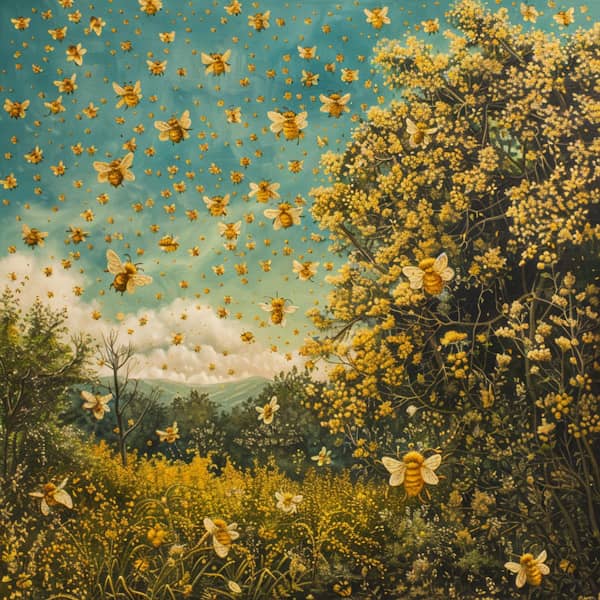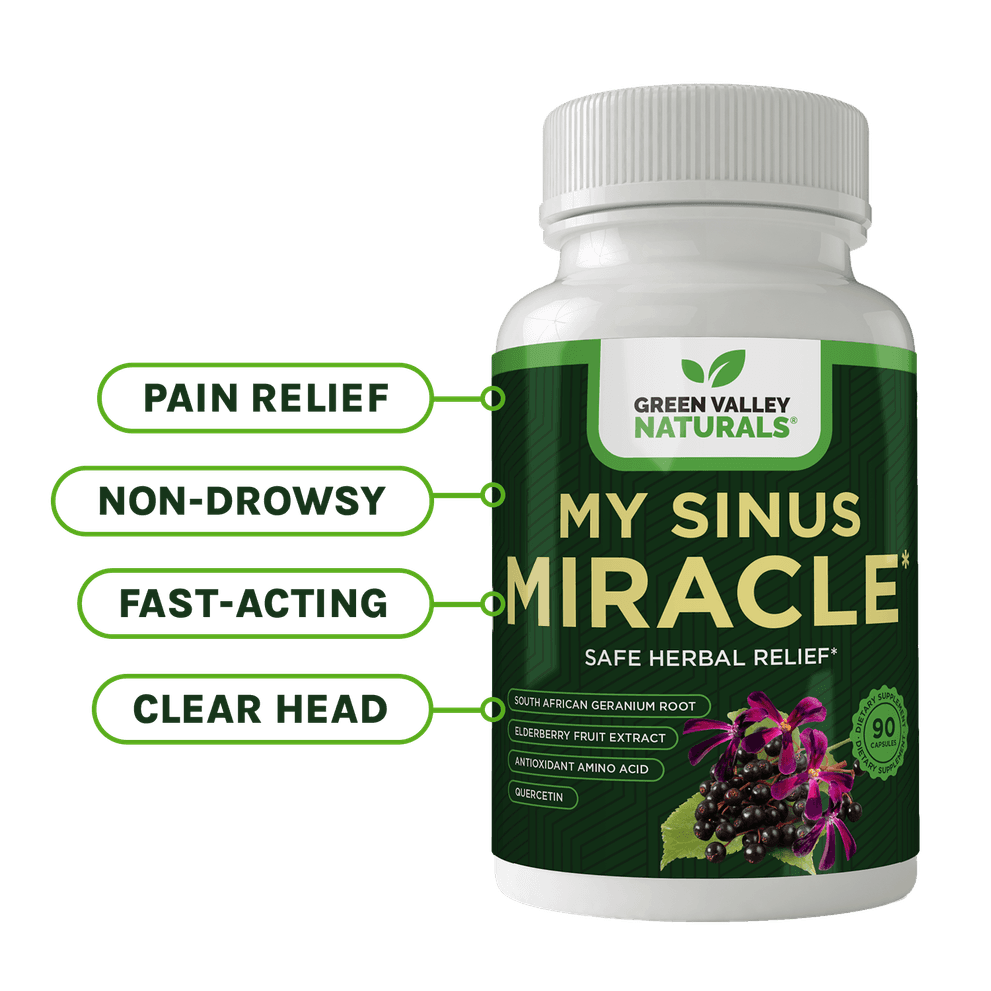
Most of us really look forward to spring with its longer days, warmer weather and new flowers. But for millions of us, spring also means itchy eyes, a dripping nose and one sneeze after another. And if you’re lucky enough to escape allergies in spring, they may be waiting to pounce on you in the summer or fall. For some, it seems like it’s always the allergy season.
What’s worse, for those of us who suffer, allergy seasons are getting longer and more intense. There are many reasons for this, but climate change plays a big part. Average springtime temperatures are two to six degrees warmer in every U.S. state except North Dakota compared to the 1970s. The growing season is now a full three weeks longer in some parts of North America. And that means more pollen for longer.
There’s little we can do about the climate in the short run, but your local pharmacist’s shelves are full of medications they can help. And if your problems are severe, you should see your doctor or allergy specialist.
But for most of us, seasonal allergies are a simple, natural problem—more of a nuisance than threat. A gentle, safe approach could be your best answer. Natural solutions such as probiotics and specific nutrients have proven to be highly effective for seasonal allergies.
Key Takeaways
- Seasonal allergies to pollen from trees, grass and weeds are affecting an increasing number of people, reaching epidemic proportions.
- Climate change is a key factor to account for this through warmer temperatures, greater amounts of carbon dioxide released, and higher nitrogen levels in the soil, all of which support plant growth, greater pollen release, and a longer pollen season.
- Symptoms can be relieved through avoidance strategies and medications. But natural remedies such as herbal and nutritional supplements are the ideal place to start.
What Are Allergies & Why Do They Occur?

Allergies occur because your body’s immune system has interpreted a typically innocuous substance (the allergen) as a threat. So, your immune system rushes to its defense by releasing chemicals like histamine. When this defense gets too energetic, you feel a range of unpleasant symptoms such as:
- Frequent sneezing
- Runny, stuffy or blocked nose
- Itchy eyes, throat, mouth or ears
- Red or watery eyes
- Cough due to postnasal drip (mucus drips down the throat from the back of the nose)
These symptoms aren’t just inconveniences. When your allergies are really acting up, they also reduce your quality of life, hamper work and school performance, lower sleep quality, reduce cognitive function, and increase irritability and fatigue.
The number of people with allergies has been rising decade after decade and is now at an astonishing level. A quarter of American adults are reported to have seasonal allergies.
While climate change may be to blame for a lot of your recent allergy symptoms, scientists have proposed other causes for widespread allergies as well. These include genetic susceptibility, changes in your habits and behaviors, lack of exposure to germs in infancy, and the environment you live in becoming more contaminated.
Now let’s look at why some of us are affected more than others and what we can do.
Allergies Can Develop At Any Time Of Life
Seasonal allergies often develop in childhood, but a formerly sneeze-free adult can wake up one day and find they too are a victim. Hay fever, allergic asthma and food allergies tend to develop earlier in life, while venom and medicine allergies are more likely to develop as we get older. Whatever your age, the symptoms and treatment are much the same.
What Causes Seasonal Allergic Rhinitis?
When allergy symptoms hit your nose, it’s called rhinitis. For seasonal allergies, pollen is the usual culprit. Pollen contains a mass of microspores needed for reproduction. The pollen in flowers is too sticky and heavy to become airborne so relies on insects like bees to spread it. But the pollen in trees, grasses, and weeds spreads on the wind. If you’re outdoors, you can’t avoid it.
A doctor may base the diagnosis of allergy on symptoms, but if there’s doubt, skin or blood tests can give clear answers. Knowing what you’re allergic to can help you avoid exposing yourself to the specific allergens that bother you. Your local weather report usually lists which allergens are high each day so you can plan your strategy.
So, what can you do? Some research shows your gut microbiome can also influence how your immune system responds to allergens, but that’s tricky. We have a few suggestions below.
Pollen Allergy Season: When Does it Start and End?

The start and end of the pollen season depends on the species of pollen-producing trees, weeds, and grasses, and the climate and weather conditions in the area you live. The length and timing of the pollen season can also vary. For instance, if the winter is especially harsh, trees may pollinate weeks later than usual. Climate change is also altering the length of pollen seasons, when pollen is released, and how much pollen plants produce. We’ll look at this in more detail later.
Types of Pollen and Their Seasons
In general, for most of the U.S., the tree pollen season runs from February/March to the end of May. Grass pollen is active in April, May and June, and the weed pollen season starts in August and ends in November. Pollen allergies are less prominent in the winter months as cold temperatures and frost suppress the ability of plants to grow and release pollen.
While there are thousands of plant species that release pollen, only a relatively small number cause problems for your respiratory system. Plant allergenicity can be mild, moderate, or severe, and while moderate allergens will still cause unpleasant symptoms, we’ll focus on the worst offenders - plants that are classed as severely allergenic.
Worst Offending Pollen Plants
Worst Offending Trees

Tree allergy season generally runs from February to May.
The following are all severely allergenic.
- Box Elder, Ash-Leaf Maple
- Eastern Red-Cedar
- Hickory
- Junipers
- Mulberry
- Oak
- Pecan
- Walnut
- Willow
To identify trees in your area you could head out with a field guide, or you could try a free app on your phone.
Worst Offending Grasses

Grass allergy season starts in April and ends in June.
Highly allergenic grasses are:
- Bermuda Grass
- Curly Blue Grass
- Large Sweet Vernal Grass
- Meadow Rye Grass
- Orchard Grass
- Perennial Rye Grass
- Prairie Koeler's Grass
Worst Offending Weeds

Weed allergy season runs from August to November, peaking in September, with pollen counts highest between about 5 am and 10 am. Weed pollens are highly prolific and can be carried for hundreds of miles. Weeds responsible for the most severe allergies include:
- Ragweed
- Sagebrush
- Five-Horn Smotherweed
- Copperweed
- Carelessweed
Allergies and Climate Change

Scientists have called climate change, “Miracle Gro for weeds.” The warming effect leads to plants blooming earlier, longer growing seasons, increased pollen load and exacerbated symptoms. Two papers published in 2021 point to this concerning trend.
Data from 60 sites across the U.S. found that between 1990 and 2018 the pollen season had extended by 20 days and pollen concentrations increased by 21 percent. The researchers found this was “strongly coupled to observed warming.” The second study used climate models incorporating a doubling of carbon dioxide (CO2) levels in north-west Europe. Doing so led the researchers to forecast that the severity of the grass pollen season in the future could increase by up to 60 percent.
Also, because of global warming, ragweed, which was traditionally confined to the U.S., is increasingly causing hay fever symptoms in many European countries - a U.S. import they could have done without! Ragweed is very sensitive to CO2, causing its production of pollen to intensify. With warmer conditions in the fall, ragweed pollen season just keeps growing and producing more flowers; that means more ragweed pollen and more misery for those who suffer ragweed allergy.
Nitrogen levels in the air have also risen. For example, increased burning of fossil fuels releases more nitrogen dust. This falls to the ground and fertilizes the soil to help plants like ragweed and poison ivy grow. So warmer temperatures, greater amounts of CO2, and higher nitrogen in the soil provide a triple whammy of factors that lead to plant growth and pollen allergy misery.
In areas like the South, which already has high humidity, the climate is getting wetter and hotter, that’s bad news for people who suffer from mold allergies. Mold loves such conditions and greater mold spores are in the air.
Let’s now move on to how sufferers can cope with seasonal allergic rhinitis.
How to Manage Allergy Symptoms

The best tactic is to avoid what you're allergic to. This is much easier said than done of course but the following tactics will help.
Remain indoors. Close windows when the pollen count is at its highest.
Wear a mask. Studies show they offer significant help to pollen allergy sufferers.
Hang washing indoors. Pollen sticks to clothes, so avoid when the pollen count is high.
Shower daily. Do this before going to bed to wash pollen away.
Wear wraparound sunglasses. They protect the eyes from pollen exposure and can significantly reduce symptoms.
Keep vehicles clean. Vacuum the interior regularly and when the pollen count is high, close windows and use the vehicle’s air conditioning.
Run air purifiers indoors. These can help filter pollen out of the air before you breathe it. Air purifiers with a HEPA filter are particularly effective.
Symptom Relief and Treatment
Over-the-Counter Treatments
If the above brings little relief antihistamines may do so. If this still falls short then anti-inflammatory steroid nasal sprays are available and if necessary, antihistamine eye drops. If good relief is still missing, then an intranasal antihistamine spray may do the trick. Be aware that some antihistamines can cause drowsiness.
Prescription Treatments
Medicines prescribed by physicians are often much the same as OTC treatments but stronger. The most-prescribed treatment combines an antihistamine with a steroid. If your allergy seems severe and persistent and can’t be controlled with medications, then talk to your doctor about allergy shots (allergen immunotherapy).
Natural Options
Changing farming practices and dietary habits over the years have lead to a shortfall of essential nutrients and an imbalance in gut bacteria. These are put forward by scientists to explain some of the reasons behind the growth of allergies. Natural approaches support the body and don’t have side effects seen with allergy medications such as nose-bleeds, dryness and irritation of the nose and throat, unpleasant taste in the mouth, and headache.
Saline rinsing: You may feel significant help by rinsing your nasal passages with a salt-water solution via an aerosolized spray, a saline rinse bottle or a teapot like contraption called a neti pot. This reduces hay fever symptoms by thinning the mucus in the nose and removing allergens lodged in the nostrils.
Nasal balms: You can pat these natural balms around your nostrils to trap pollen before it enters the nose and causes symptoms.
N-acetylcysteine (NAC): Numerous allergenic pollen grains contain an enzyme that rapidly increases levels of free radicals called reactive oxygen species. The dietary supplement NAC is a potent antioxidant, countering free radicals and inflammation.
NAC can also reduce the severity of allergic reactions by modulating the immune system’s response. One study on ragweed-sensitive patients found the allergic response was lower and NAC reduced nasal symptoms.
In a study of animals with allergic rhinitis, NAC was shown to alleviate the clinical symptoms of the condition. NAC also keeps mucus loose and promotes healthy drainage, making it easier to expel. One study found nearly 90 percent of participants taking NAC reported significant improvement in sinus problems. Another found it effectively cleared mucus in healthy volunteers and “therefore may be beneficial in conditions...such as rhinitis and sinusitis.”
Pelargonium root extract: If you’re a gardener, you may recognize pelargonium as the Latin name for geraniums. But the species you want for your allergies is a cousin, pelargonium sidoides, or African geranium. It’s native to South Africa and has long been used in traditional medicine there. It strengthens the immune system by increasing the activity of white blood cells and helps clear mucus from the sinuses.
A study involving 105 people showed Pelargonium extracts significantly improved sinusitis symptoms, with faster recovery than those taking a placebo (dummy pill). According to Sarah Brewer, a UK medical doctor, Pelargonium treats colds, sore throat, sinusitis and acute bronchitis “better than anything I can prescribe as a doctor.”
Quercetin: This plant pigment, found in fruits and vegetables, is a powerful antioxidant and crucially, can prevent histamine from being released. Quercetin therefore acts as a natural antihistamine and anti-inflammatory agent. According to Robin Foroutan, spokesperson for the Academy of Nutrition and Dietetics, “Histamines are to blame for symptoms like seasonal allergies, so high doses of quercetin can be really helpful to reduce seasonal allergy and hay fever symptoms.”
Until recently this was supported only by lab studies, but the first human trial found that within 4 weeks “allergic symptoms, such as eye itching, sneezing, nasal discharge, and sleep disorder, were significantly improved in the quercetin-containing supplement group compared with the placebo group.” The researchers also noted that “the quality of life of these subjects significantly improved.”
Take Them All Together? Yes, You Can...
The ability of these three natural products to powerfully reduce seasonal allergy symptoms led to the creation of Green Valley Naturals’ My Sinus Miracle™ supplement. This supplement contains all three remedies plus other supportive nutrients to provide fast-acting relief to allergy symptoms.
Summary
Allergies are an increasing problem, affecting more and more people of all ages as growing seasons are extended and pollen levels rise. Climate change is the important factor we can’t entirely control, but there is a lot we can do to improve our relief. Using air purifiers, masks and keeping any areas you inhabit clean can help ease your symptoms. So can prescription drugs and over-the-counter remedies. Natural supplement remedies such as quercetin, NAC, and pelargonium are also a scientifically proven way to bring about symptomatic relief.
Frequently Asked Questions
When does allergy season begin and end?
This can vary but in general, tree allergy season runs from March to May, grass allergy season runs from April to June and the weed allergy season runs from August to November.
Can a person develop seasonal allergies later in life?
Yes, it's possible to develop seasonal allergies at any time of life.
What month is pollen the highest?
April for tree pollen, June and July for grass pollen and September for weed pollen
What natural remedies help reduce symptoms?
A diet high in antioxidant-containing fruits and vegetables, probiotics to improve the makeup of the gut bacteria, and nutrients and herbs such as those found in My Sinus Miracle™.
Axios. March 15, 2024. https://www.axios.com/2024/03/15/spring-2024-warmer-temperatures-climate-change
Bachert C, et al. Rhinology. 2009 Mar;47(1):51-8 Treatment of acute rhinosinusitis with the preparation from Pelargonium sidoides EPs 7630: a randomized, double-blind, placebo-controlled trial. https://pubmed.ncbi.nlm.nih.gov/19382496/
Balch B. April 9, 2004. Do seasonal allergies seem to be getting worse? Am. Ass. Of Medical Colleges (AAMC). https://www.aamc.org/news/do-seasonal-allergies-seem-be-getting-worse-blame-climate-change
Elahi M and Elahi H. Otolaryngol (Sunnyvale) 2015, Vol 5(1): 182 The Effects of N-Acetyl Cysteine on Nasal Mucociliary Clearance in Healthy Volunteers: A Randomized, Double-Blind and Placebo-Controlled Study https://www.omicsonline.org/peer-reviewed/the-effects-of-nacetyl-cysteine-on-nasal-mucociliary-clearance-in-healthy-volunteers-a-randomized-doubleblind-and-placebocontrolle-36315.html
Faroque S. Understanding Allergy. Penguin Life (Expert book series) 2022.
Kalyuzhin OV. Ter Arkh. 2018 Apr 19;90(3):89-95. Effect of N-acetylcysteine on mucosal immunity of respiratory tract. https://pubmed.ncbi.nlm.nih.gov/30701862/
Lane CJ et al. J Allergy Clin Immunol Feb 2009 Vol 123(2) Suppplement S 53. Topical N-acetyl cysteine (NAC) reduces late phase nasal symptoms following ragweed challenge. jacionline.org/article/S0091-6749(08)02592-X/fulltext
MacPhail, T. Allergic: Our Irritated Bodies in a Changing World. Random House. 2023
Native Plant Trust Go Botany https://gobotany.nativeplanttrust.org/
Pollen Library https://www.pollenlibrary.com/
Shortsleeve C and Capetta A. Prevention. JUL 05, 2022. What Is Quercetin, and What Are Its Benefits? https://www.prevention.com/food-nutrition/a23935052/quercetin-benefits/
Sarah Brewer. https://drsarahbrewer.com/herbs/pelargonium
Yamada S, et al. Eur Rev Med Pharmacol Sci. 2022 Jun;26(12):4331-4345. Effects of repeated oral intake of a quercetin-containing supplement on allergic reaction: a randomized, placebo-controlled, double-blind parallel-group study https://pubmed.ncbi.nlm.nih.gov/35776034/

